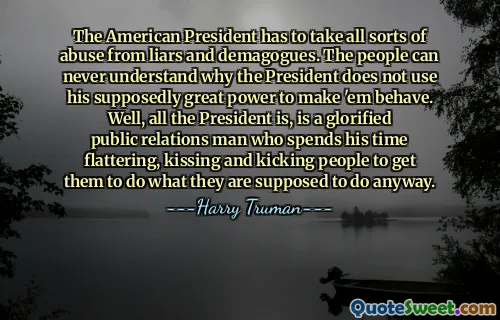Harry Truman, born in 1884, became the 33rd President of the United States after Franklin D. Roosevelt's death in 1945. He initially served as Roosevelt's vice president, and upon ascension, he was faced with the immediate challenges of World War II. Truman made the controversial decision to use atomic bombs on Hiroshima and Nagasaki, which led to Japan's surrender and the end of the war. His leadership during this tumultuous period was marked by decisive actions that significantly impacted the course of history. Following the war, Truman focused on rebuilding Europe through initiatives like the Marshall Plan, which helped stimulate recovery and prevent the spread of communism. His administration also saw the beginning of the Cold War, leading to policies aimed at containing Soviet influence, including the Truman Doctrine. His straightforward approach to governance and commitment to civil rights set a precedent for future leaders. Truman's presidency was characterized by his belief in a fair society, which included advocating for racial integration and economic fairness. He left office in 1953 with mixed approval ratings, yet his legacy grew over time, reflecting his role in significant global decisions and social policies. Truman is now remembered as a pivotal figure in shaping modern America and its foreign relations.
Harry Truman, born in 1884 in Lamar, Missouri, rose through the ranks of politics to become the 33rd President of the United States. He took office in 1945 after the death of Franklin D. Roosevelt, bringing his own unique leadership style and perspective to a nation in crisis.
Truman's presidency was marked by critical decisions, including the use of atomic bombs in WWII and the initiation of the Marshall Plan for European recovery. His administration faced the burgeoning tensions of the Cold War and took concerted actions to address the challenge of communism globally.
Beyond foreign policy, Truman's commitment to social justice and civil rights laid the groundwork for future reforms. Although he faced challenges during his time in office, his legacy has grown to reflect his significant contributions to shaping the United States' trajectory in both domestic and international arenas.
More »
Today Birthdays
1729 -
Edmund Burke
1949 -
Haruki Murakami
1954 -
Howard Stern
1876 -
Jack London
1993 -
Zayn Malik
1951 -
Kirstie Alley
1863 -
Swami Vivekananda
1923 -
Alice Miller
1987 -
Naya Rivera
1825 -
Brooke Foss Westcott
1944 -
Joe Frazier
1951 -
Rush Limbaugh
1964 -
Jeff Bezos
1978 -
Jeremy Camp
1628 -
Charles Perrault
1856 -
John Singer Sargent
1970 -
Kaja Foglio
1953 -
Rick Santelli
1986 -
Gemma Arterton
1968 -
Raf Simons
1958 -
Christiane Amanpour
1966 -
Olivier Martinez
1996 -
Ella Henderson
1917 -
Maharishi Mahesh Yogi
1949 -
Ottmar Hitzfeld
1928 -
Ruth Brown
1968 -
Heather Mills
1946 -
George Duke
1968 -
Rachael Harris
1923 -
Ira Hayes
